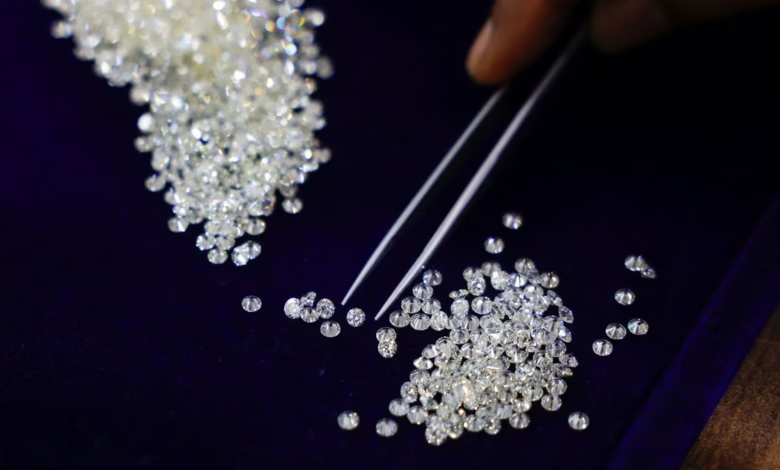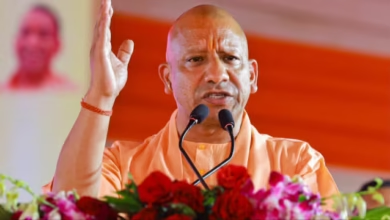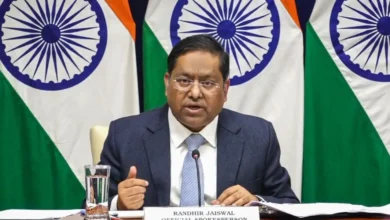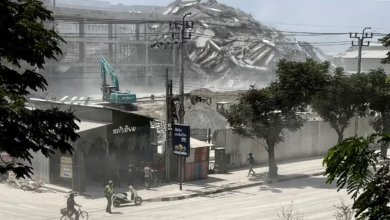US Tariffs Threaten Diamond Industry, Forcing Struggle for Survival Under Mounting Pressure
In 2023-24, the U.S. made up nearly 30% of India’s $10 billion gems and jewellery exports, putting the industry at risk amid rising tariffs.


US Tariffs Jeopardize India‘s Diamond Business as Exports Fall and Surat Confronts Worsening Crisis
Ahmedabad: India’s diamond and jewelry sector is preparing itself for a possible crisis with a 26% adjusted reciprocal tariff proposed by U.S. President Donald Trump potentially strangling exports and adding to the woes of an already besieged industry. With America being the destination of close to 30% of India‘s gems and jewelry exports, worth around $10 billion a year in 2023–24, the effect of a tariff could be cataclysmic.
Both natural and synthetic diamonds form a considerable chunk of India‘s exports of jewellery, and officials warn that the new tariff could result in lay-offs, plant closures, and realignment of supply chains globally.
Kirit Bhansali, the Chairman of Gems and Jewellery Export Promotion Council of India (GJEPC), cautioned that the new tariff would be a major burden for both Indian exporters as well as US buyers. “Whereas the tariffs imposed on competing countries are a challenge as well as an opportunity, the diamond and jewelry industry in India may see imminent setbacks. It will be hard to maintain our $10 billion export quantum to the U.S. market over the short term. We urge the Government of India to finalize the Bilateral Trade Agreement with the U.S. quickly in order to establish the long-term interests of the industry,” he said.
Experts note that Surat, the epicenter of India‘s diamond polishing industry, stands out as highly exposed. Surat processes 85–90% of all diamonds in the world and provides jobs for more than 800,000 individuals. Already under strain from the extended slump induced by sanctions imposed on Russian diamonds, soft demand from major overseas markets such as China and Europe, and substitute competition from cultured stones, the new tariff will push the sector to the limits.
“If suddenly the buyers have to pay 26% extra, it will drive them out of the market,” said Mehul Shah, Vice-Chairman of Bharat Diamond Bourse. “Several cutting and polishing units in Surat will be compelled to shut down.”
Shah, the chairman of the Gemmological Institute of India as well, observed that whereas some exporters could divert shipments to Dubai, which charges only a 10% duty, such matters as certificate of origin and restricted manufacturing capabilities in Dubai stand in the way. As an interim solution, he proposed the permitting of sales in the domestic market from India‘s gems and jewellery SEZs with a relaxation of certain regulations.
India‘s overall gross exports of gems and jewellery between April 2024 and February 2025 were $25.73 billion (₹2.17 lakh crore), down by 13.43% in dollar terms from $29.72 billion (₹2.46 lakh crore) during the corresponding period last year. Imports fell by 13.31% in dollar terms to $17.50 billion (₹1.48 lakh crore).
Exports of cut and polished diamonds declined to $12.14 billion (₹1.02 lakh crore), 18.01% lower in dollar terms, while imports of the same type declined 35.21% to $1.16 billion (₹9,774 crore). Imports of rough diamonds also fell 26.18% to $9.5 billion (₹80,090 crore).
The economic loss is also costing a tragic human price. Bhavesh Tank, the Vice-President of the Diamond Workers Union Gujarat (DWUG), confirmed that he had handed over a list of 63 diamond workers who took their own lives last year to the state government. “The recession is pushing us to the brink, and this tariff may be the last nail in the coffin,” he explained. The DWUG has been on an indefinite strike from March 30, asking for financial assistance, job security, and family support for the affected workers.
On April 3, nearly 300 employees of RC Diamond in Navsari came on strike demanding pay increases following salaries declining up to 50% in the past three years. Despite assurances from the Gujarat government to set up a committee, workers say no real help has been forthcoming.
Diamond tycoon Savjibhai Dholakia of Hari Krishna Exports noted that the industry operates on a slim 2% profit margin, making a 26% tariff unsustainable. “Diamonds aren’t essential commodities—buyers will simply switch to alternatives like gold,” he said. However, he remained cautiously optimistic: “Our industry has faced many challenges and employs lakhs of people—we’ll find solutions to this too.”
Dinesh Navadiya, Indian Diamond Institute Chairman and Surat Diamond Bourse spokesperson, shared similar apprehensions but highlighted opportunities too. “Increased tariffs on China and Thailand may open up new opportunities for India. Moreover, most companies already have offices in Dubai and can think of diverting exports.”
Navadiya underlined the importance of long-term policy measures, such as a Free Trade Agreement (FTA) with America. “India imports only small amounts of rough diamonds from the U.S., subject to a paltry 5% duty. A bilateral FTA for the gems and jewellery industry—similar to those with the UAE and Australia—can provide stability and unlock future potential,” he stated.
As the saga continues to evolve, everyone’s eyes are on the Indian and American governments to negotiate a way out before pressure becomes irretrievably destructive to one of India‘s most manpower-intensive industries.






